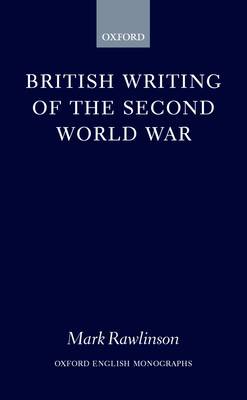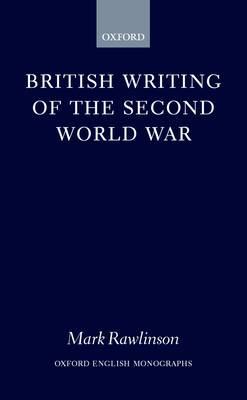
Je cadeautjes zeker op tijd in huis hebben voor de feestdagen? Kom langs in onze winkels en vind het perfecte geschenk!
- Afhalen na 1 uur in een winkel met voorraad
- Gratis thuislevering in België vanaf € 30
- Ruim aanbod met 7 miljoen producten
Je cadeautjes zeker op tijd in huis hebben voor de feestdagen? Kom langs in onze winkels en vind het perfecte geschenk!
- Afhalen na 1 uur in een winkel met voorraad
- Gratis thuislevering in België vanaf € 30
- Ruim aanbod met 7 miljoen producten
Zoeken
Omschrijving
British Writing of the Second World War is the first study to provide a detailed critical and historical survey of British literary culture in wartime. Concerned as much with war as with writing, it explores the significance of cultural representations of violence to the administration of the war effort. A theoretical account of the symbolic practices which connect military violence to policy provides a framework for analysing imaginative and documentary literature in its relations both to propaganda and to Peoples War ideals of social reconstruction. The book evaluates wartime fictions and memoirs in the context of official and unofficial discourses about military aviation, the Blitz, campaigns in North Africa, war aims, the conscript Army and the Home Front, Prisoners of War, and the Holocaust. It uncovers the processes by which the meanings the war had for participants were produced, and provides an extensive bibliographical resource for future scholarship.
Specificaties
Betrokkenen
- Auteur(s):
- Uitgeverij:
Inhoud
- Aantal bladzijden:
- 256
- Taal:
- Engels
- Reeks:
Eigenschappen
- Productcode (EAN):
- 9780198184560
- Verschijningsdatum:
- 13/07/2000
- Uitvoering:
- Hardcover
- Formaat:
- Genaaid
- Afmetingen:
- 140 mm x 216 mm
- Gewicht:
- 471 g

Alleen bij Standaard Boekhandel
+ 805 punten op je klantenkaart van Standaard Boekhandel
Beoordelingen
We publiceren alleen reviews die voldoen aan de voorwaarden voor reviews. Bekijk onze voorwaarden voor reviews.









